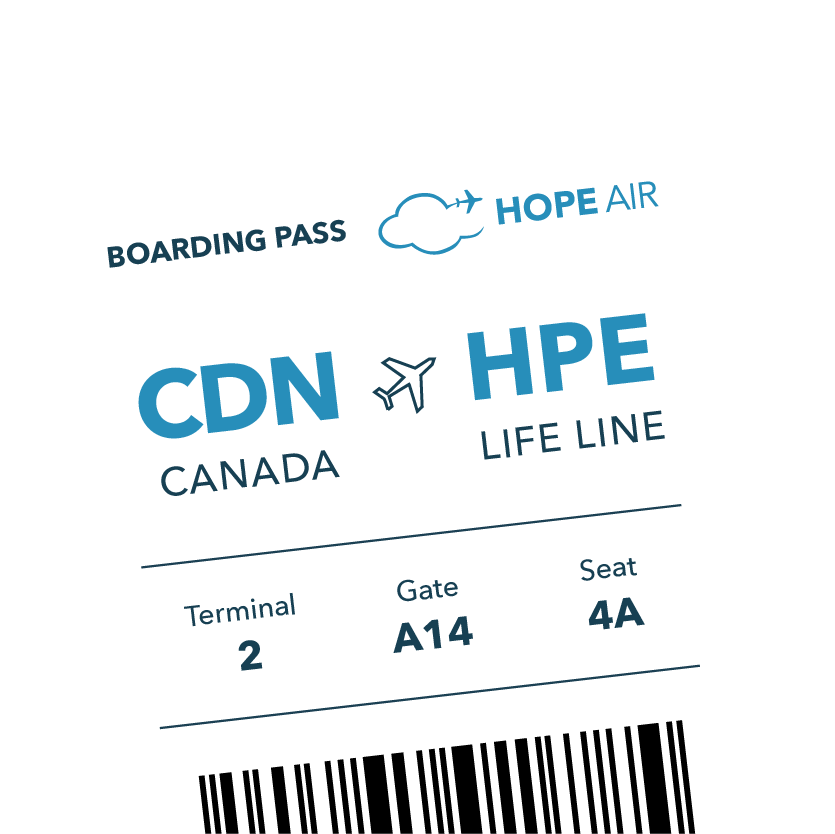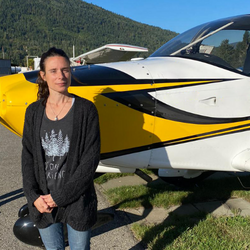Hope Air helps family from the B.C. interior travel to treatment for son’s rare neurological condition
Hope Air helps family from the B.C. interior travel to treatment for son’s rare neurological condition


A 18-year-old from Nelson is doing well after multiple flights to Vancouver for treatment of a rare neurological condition, called GLUT1 deficiency. Hope Air flights helped Genevieve and her son avoid dangerous driving conditions so they could get to his appointments.
Genevieve’s son was first diagnosed when he was just seven weeks old. A GLUT1 deficiency means that there is a protein lacking that is responsible for transporting glucose (sugar) into the brain and giving the brain fuel. The treatment for GLUT1 deficiency requires a strict diet to ensure the brain is getting the fuel it needs.
Genevieve’s son was first diagnosed when he was just seven weeks old. A GLUT1 deficiency means that there is a protein lacking that is responsible for transporting glucose (sugar) into the brain and giving the brain fuel. The treatment for GLUT1 deficiency requires a strict diet to ensure the brain is getting the fuel it needs.
Roger and his wife Susie are from Northern Ontario, a nearly thirteen-hour drive from the hospital Roger would have to reach for his compartment syndrome surgery in Hamilton, Ontario. Roger lives near Kapuskasing, Ontario, with his wife Susie. His symptoms first began 15 years ago, with intense pressure and pain in his legs and arms that was accompanied by swelling.
After visiting several doctors near his home and in Thunder Bay, Roger was diagnosed with compartment syndrome, a condition where his muscles expanded as if he had done strenuous exercise. Compartment syndrome is a rare condition where, untreated, causes nerve damage, amputation, loss of muscle function, and kidney failure, among other consequences. Doctors did not know what caused Roger’s condition, but knew that it needed urgent medical intervention.
After visiting several doctors near his home and in Thunder Bay, Roger was diagnosed with compartment syndrome, a condition where his muscles expanded as if he had done strenuous exercise. Compartment syndrome is a rare condition where, untreated, causes nerve damage, amputation, loss of muscle function, and kidney failure, among other consequences. Doctors did not know what caused Roger’s condition, but knew that it needed urgent medical intervention.
This diagnosis meant frequent trips to BC Children’s Hospital to see specialists for treatments and checkups. Genevieve’s son would have to see dietitians to help develop a plan and return for routine tests to ensure the plan was working for him.
Genevieve says it would have been difficult to drive the route from Nelson to Vancouver and back on a regular basis.
The route is long and dangerous, especially in the winter months with unpredictable mountain weather. The drive alone would be eight hours each way. This would be a long and uncomfortable journey for an infant, and paying for flights on their own would be costly.
Genevieve found that she could have access to free flights when a social worker at the hospital told her about Hope Air.
“It has made an incredible difference for us to not have to drive or pay for flights,” says Genevieve.
Today, Genevieve’s son is doing well and still lives with GLUT1, and they continue to travel to Vancouver for appointments with dietitians and tests to monitor his health.
Genevieve found that she could have access to free flights when a social worker at the hospital told her about Hope Air.
“It has made an incredible difference for us to not have to drive or pay for flights,” says Genevieve.
Today, Genevieve’s son is doing well and still lives with GLUT1, and they continue to travel to Vancouver for appointments with dietitians and tests to monitor his health.
We acknowledge that we live and work on the unceded, traditional territories of many Indigenous peoples. We are grateful for the privilege of being on lands that these peoples have nurtured since time immemorial.
Renouvellement annuel du pilote VPP de Hope Air 2022
Exigences de mise à jour des connaissances:
- Au moins 50 heures en tant que commandant de bord sur un avion et 30 heures comme CdB
au cours des 12 derniers mois. - Au moins un vol transnational dans les 90 derniers jours
- Au moins 3 heures comme CdB sur type dans les 90 derniers
jours - Doit satisfaire aux exigences de mise à jour des connaissances des pilotes de Transports Canada: https://tc.canada.ca/fr/aviation/delivrance-licences-pilotes-personnel/garder-ses-connaissances-competences-pilote-jour
Veuillez noter que tous les pilotes bénévoles doivent être entièrement vaccinés contre la COVID-19.
Pour toute question ou préoccupation, veuillez contacter Andrew Knight à aknight@hopeair.ca
Coordonnées
Formulaire pour exprimer l’intérêt de devenir pilote bénévole
Volunteer with Hope Air
Formulaire de contact Devenez un ambassadeur de Vols d’espoir
Formulaire de contact Offrez vos talents
Formulaire de contact pour devenir bénévole au bureau (virtuel)
Bénévole au service à la clientèle
Volunteer with Hope Air
Become A Hope Air Ambassador Contact Form
Volunteer Your Talents Contact Form
Volunteer In (Virtual) Office Contact Form
Volunteer With Client Care
2022 Hope Air VPP Pilot Annual Renewal
Recency Requirements:
- At least 50 hours PIC on aircraft and 30 hours PIC in the past 12 months
- At least one cross-country flight in the last 90 days
- At least three hours PIC on type in the last 90 days
- Must satisfy the Transport Canada Pilot Recency Requirements: https://tc.canada.ca/en/aviation/licensing-pilots-personnel/staying-current-proficient-pilot
Please note, all volunteer pilots must be fully vaccinated for COVID-19.
For questions or concerns, please contact Andrew Knight at aknight@hopeair.ca
Contact Information
Volunteer Pilot Expression of Interest Form